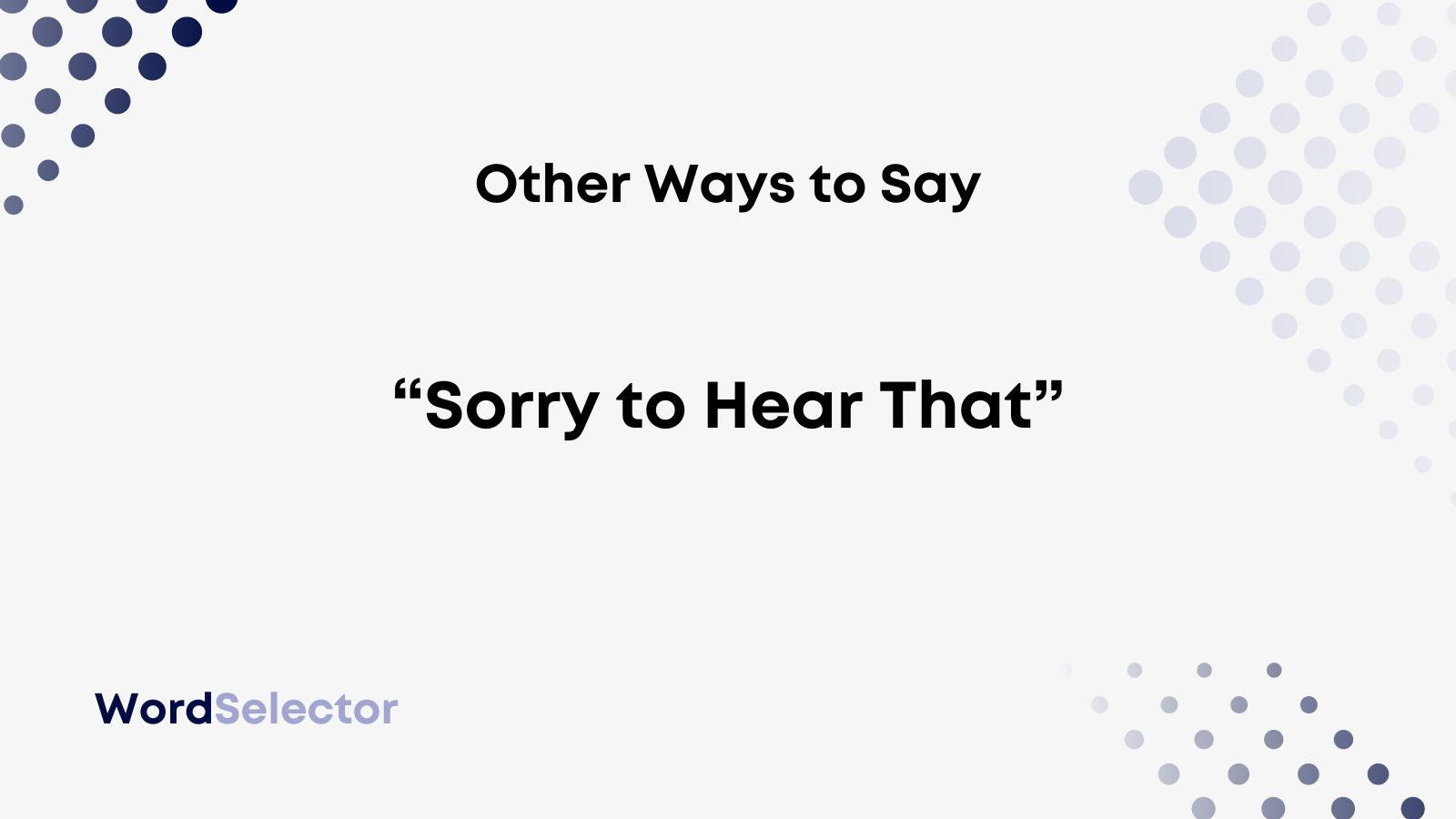Has someone just told you some bad news, and you want to say “sorry to hear that”? Perhaps you’re wondering whether the phrase is appropriate in a business email or similar context.
Well, you’re in the right place. This article will explain what to say instead of “sorry to hear that.” We’ve gathered some great alternatives to help.
Other Ways to Say “Sorry to Hear That”
- You have my sympathies
- That’s tragic
- That’s too bad
- Sorry about
- I’m very sorry you’re going through that
- It must be hard for you
- Is there anything I can do?
- Sorry that you feel bad
- I wish there was something I could do
- My condolences
- That fills me with the deepest sorrow
KEY TAKEAWAYS
- “Sorry to hear that” is a great phrase to use in formal and informal contexts.
- “You have my sympathies” is a great professional phrase to include in emails.
- “That’s tragic” is a conversational phrase you can use when receiving some bad news.
Stay with us to learn more about the best synonyms. We’ve explained more about how they work in different contexts.
Also, you can skip to the final section to learn whether it’s OK to say “sorry to hear that.” Then, you’ll know whether it’s worth including in your formal emails.
You Have My Sympathies (Formal)
“You have my sympathies” is a professional way to say “sorry to hear that.” It is a very useful phrase that shows you regret hearing some bad news in a formal capacity.
For instance, you might include it when someone has told you they need time away from work. If an employee tells you they can’t come in, “you have my sympathies” is a respectful way to accept that they need some time off.
It’s also quite a friendly statement, even though it is suitable in professional contexts. That’s why we think it’s a great choice to include in your emails or formal writing.
We recommend using “you have my sympathies” in similar situations to “sorry to hear that.” Both are effective, so you can switch between them to keep your writing engaging.
Check out the following example to see how to use it:
Dear Abbie,
You have my sympathies. Please let me know if there’s anything I can do to help you.
Kind regards,
Joshua
That’s Tragic (Informal)
“That’s tragic” is a good informal synonym. You can use it in text messages and other written scenarios, but you should only keep it to conversational situations.
Generally, “that’s tragic” works best when talking to friends. It works after they’ve shared some bad news, and you want to sympathize with them. However, it’s somewhat dismissive, so you need to know the friend well before using it.
Alternatively, you can use it sarcastically. For instance, a friend might come to you with a problem, but they might be overselling it and making it sound worse than it is. “That’s tragic” can shut them down quickly while making a joke about the situation.
You should avoid using “that’s tragic” in professional contexts. It’s far too casual for that. Stick with “sorry to hear that” if you want to be polite and respectful.
Here are a few examples to give you a hand:
Oh no! That’s tragic! I wish there was something I could do. You shouldn’t have to go through this.
That’s tragic, but I don’t know what to say. What are you going to do about it, though?
Is It OK to Say “Sorry to Hear That”?
“Sorry to hear that” is correct and acceptable. You can use it in formal and informal writing after receiving some bad news.
It is not rude to say “sorry to hear that.” In fact, it’s a quick and easy way to show regret through an apology (even if you had nothing to do with the bad news). So, it’s not bad to say it, and you will find plenty of contexts where it applies.
Here are some other variations you can use also:
- I’m sorry to hear that
- I am so sorry to hear that
- Sorry to hear that. Hope you feel better soon
- Sorry to hear that. Take care
The only thing worth remembering is whether you use “I” or not. If you include a personal pronoun (i.e., “I’m sorry to hear that”), it sounds more personal and apologetic.
Without the personal pronoun, “sorry to hear that” can sound a bit impersonal or forced. It’s certainly better to use “sorry to hear that” when you’re not very familiar with the recipient (i.e., formal emails).
Don’t forget to bookmark this page to remind yourself of the best synonyms. You never know when you might need to use them again, after all.

